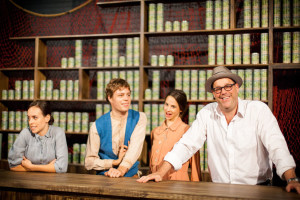Roundhouse Theatre, WAAPA
reviewed by Neville Cohn

‘All My Sons’ 3rd Year Acting / WAAPA Production (2015) / Photography © Jon Green 2015 – All Rights Reserved
Arthur Miller’s All My Sons comes across with implacable, near-overwhelming intensity, a tour de force with young actors giving proof of significant potential.
Tom Healey’s direction holds – indeed rivets – the attention throughout and despite the actors’ youth, they give characterisations that more often than not are close to the emotional epicentre of each part. Miller spares neither players nor audience in a play that brings us face to face with families in self-destructive mode. Its intense reality does not so much attract the attention as rivet it.

‘All My Sons’ 3rd Year Acting / WAAPA Production (2015) / Photography © Jon Green 2015 – All Rights Reserved
Healey’s guiding hand ensures there isn’t a weak moment in this production by 3rd- year acting students at WAAPA.
In essence, the play, set in the early aftermath of World War II, is about the corrosive, devastating after-effects on two families of faulty warplane parts causing the deaths of 21 pilots in training exercises over Australia.
Guilt, subterfuge, regret, emotional devastation, self-delusion and self-destruction are the currency of Miller’s masterpiece – and invariably, the actors rise to the challenge.
Bevan Pfeiffer is particularly effective as Chris Keller who has survived the war – and Brittany Morell, entirely persuasive as Chris’ hysteria-prone mother who insists, against all the odds, that her elder son, a war pilot, is still alive. He isn’t but it would be unfair to intending theatre-goers to reveal what is one of the gut-wrenching climaxes of the play.
Arthur Miller provides an inspired dissection of ordinary Americans who find themselves in a devastating emotional maelstrom.
In a convincing characterisation as the ethically challenged Joe Keller, Chris’ father, Andrew Creer comes up trumps – but in visual terms he looks too young. Skilled makeup could well have resolved this issue.
Stephanie Panozzo gives a touching performance as Anne Deever – and Hoa Xuande is impressive as George.
Cameron Routley’s lighting design is consistently effective; so, too, is Sallyanne Facer’s set design of a typical US backyard. Music, however, was far too loud and overwhelming in a negative sense.







